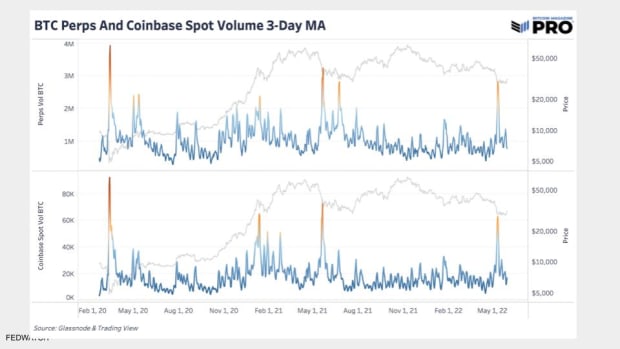One-third of Americans could own bitcoin by the end of 2022. The U.S. government will want to appease this voting bloc with favorable policies toward bitcoin.
Watch This Episode On YouTube
Listen to this Episode:
- Apple
- Spotify
- Google
- Libsyn
- Overcast
In this episode of Bitcoin Magazine’s “Fed Watch” podcast, fellow host Christian Keroles and I had the opportunity to sit down and have an epic conversation with Log Scale of Twitter, and host of “The Bitcoin Spot” series of Twitter Spaces, and new YouTube channel. This episode is a big white pill for those down about the recent price dip and who think of the U.S. as an evil empire. We get into many aspects of institutional client money coming into Bitcoin this year, and why the U.S. is likely to be one of the most friendly Bitcoin jurisdictions in the future.
“Fed Watch” is a podcast for people interested in central bank current events. Bitcoin will consume central banks one day, understanding and documenting how that is happening is what we are all about here at “Fed Watch.”
A Valuation Model For Bitcoin
Log Scale wrote a very interesting Twitter thread several weeks ago. The first part of this episode is him laying out the arguments that he made there. Corporate treasuries diversifying into bitcoin have been a major source of optimism in the Bitcoin space over the last year or two, but Log Scale says they are only 2% of all investable wealth in the world. Signs are starting to shift toward the other $500 trillion looking at bitcoin, too.
You can find estimates for total investable wealth from several sources. Log Scale cites Credit Suisse in this episode and McKinsey in his tweet thread. Both have a multitrillion-dollar estimate of total global investable wealth.
Of course, every dollar that is used to buy bitcoin is not going to have a one-to-one effect on the bitcoin market cap. The multiplier is not a steady variable; the Bank of America has estimated it at 107 times, but in his conservative valuation model, Log Scale uses three times. Now, what his model needs is an estimate for the amount of money that will come into bitcoin.
For this, Log Scale draws from Brian Anderson’s write-up of Ric Edelman’s 2022 predictions for bitcoin. According to Anderson, Edelman is one of the most prominent thought leaders in the investment advisory field as well as being the founder of Edelman Financial Engines. Nearly all of Edelman’s predictions from 2021 proved correct, and this year he has some big ones. He says that, by the end of the year, (1) one-third of Americans will own bitcoin, and (2) financial advisors will be recommending between 3% to 5% allocation to bitcoin.
With those numbers, Log Scale’s valuation model is just a matter of plugging in the numbers, yielding a result that the bitcoin market cap could increase by $11 trillion this year.
Gensler And Why The US Will Be Friendly To Bitcoin
The next part of the podcast might be controversial. We spend some time discussing Gary Gensler and possible reasons behind his appointment as chairman of the U.S. Securities and Exchange Commission (SEC) at a pivotal time, with such a clear pro-bitcoin bias.
Most people think that the U.S. government will fight Bitcoin adoption, but Log Scale explains why the fight will be ineffective. Bitcoin’s incentives work on regulators the exact same way as everyone else. As an aside, we see the ineffectiveness of attempted government regulation in Ukraine and Russia at the moment, with friendly bitcoin policies coming about due to rich and powerful people in these countries owning a lot of bitcoin.
If the U.S. government is worried about losing its supposed currency advantage, it’s easy enough for them to buy bitcoin and back the dollar. If the choice is between losing global dominance of the dollar or buying bitcoin, that is an easy choice. There is effectively no downside for the U.S. government in this scenario. The other option is for the U.S. government to fight bitcoin and impose sanctions, which would be politically unpopular with the potential one-third of Americans that might own bitcoin by the end of the year.
Back to Gensler, Log Scale tells us that Gensler is a big admirer of Satoshi and taught a course on Bitcoin and blockchain technology at MIT prior to becoming chairman of the SEC. The one outstanding qualification Gensler had over other options for the SEC was that he is an expert and a lover of Bitcoin.
Q And A About Powell And Federal Reserve Policy
At the end of the show, Log Scale and CK had to leave, but there were still a few minutes to fill on the livestream segment before the next guest came on. This gave me a great opportunity to answer some questions from the Livestream host, Q, about Powell, the Federal Reserve’s likely policy path this year and other topics around central banking.
It is a recurring theme of questions I receive from viewers and listeners that people think the Fed is going to crash the market by raising interest rates. However, the powerful insight is that the markets are in control, not the Fed. Their job is to predict where the market will be in six to 12 months, sometimes 24 months then position a narrative for their monetary policy to be ahead of that move. The most they can do is try to mold market sentiment.
If their monetary tools actually worked as they are believed to, through concrete quantitative effects, the Fed wouldn’t need such tailored and precise language and there wouldn’t be so much confusion on the path of inflation or the economy. The Fed could just adjust the dials to get the economy they wanted. That’s not the case.
Listen to the end to get more truth bombs on what’s coming in 2022 from the Fed.
This is a guest post by Ansel Linder. Opinions expressed are entirely their own and do not necessarily reflect those of BTC Inc or Bitcoin Magazine.









